Related Research Articles

Fisk University is a private historically black liberal arts college in Nashville, Tennessee. It was founded in 1866 and its 40-acre (16 ha) campus is a historic district listed on the National Register of Historic Places.

Dorothy Irene Height was an African-American civil rights and women's rights activist. She focused on the issues of African-American women, including unemployment, illiteracy, and voter awareness. Height is credited as the first leader in the civil rights movement to recognize inequality for women and African Americans as problems that should be considered as a whole. She was the president of the National Council of Negro Women for 40 years. Height's role in the "Big Six" civil rights movement was frequently ignored by the press due to sexism. In 1974, she was named to the National Commission for the Protection of Human Subjects of Biomedical and Behavioral Research, which published the Belmont Report, a bioethics report in response to the infamous Tuskegee Syphilis Study.
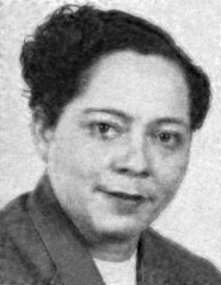
Cora Mae Brown was the first African-American woman elected to a state senate in the United States. She won her seat in the Michigan Senate in 1952. Brown was a Democrat who represented Detroit.

Juliette Derricotte was an American educationist and political activist. At the time of her death, she was the Dean of Women at Fisk University.

Grace Longwell Coyle (1892–1962) was a highly influential American thinker in the area of social work with groups. She wrote important books on the subject, and had great influence on the development of teaching group work concepts.

Mary Colton, was an Australian philanthropist and suffragist.

Cecelia Cabaniss Saunders sometimes written as Cecilia Cabaniss Saunders, was an African-American civil rights leader, and executive director of the Harlem, New York YWCA. She is best known for working against racial discrimination in wartime employment during World War II, for broader work training and opportunities for African-American women, and against police violence in Harlem.
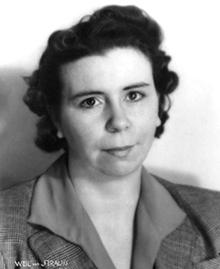
Rose R. Terlin was an American Christian leader, economist, author of several books on religion and economic justice and a YWCA leader. During and after World War II (1939–45) she held various senior government positions.

Nettie Langston Napier was an African-American activist for the rights of women of color during the early part of the 20th century. She lived in Nashville, Tennessee.
Joyce Piliso-Seroke is a South-African educator, activist, feminist and community organizer. A former vice president of the World YWCA, she traveled internationally to speak about the effects of apartheid, overcoming imprisonment and attempted censorship in her pursuit of justice and gender equality. She is a member of South Africa's national Order of the Baobab in Gold, and was appointed the first chair of the South African Commission for Gender Equality.
Katharine DuPre Lumpkin was an American writer and sociologist from Macon, Georgia. She is a member of both the Georgia Writers Hall of Fame and the Georgia Women of Achievement.
Adele Hagner Stamp (1893–1974) was the first dean of women at the University of Maryland, College Park and later named dean of women emeritus from the University Board of Regents. In 1990 she was inducted into the Maryland Women's Hall of Fame. In 1983, the University of Maryland named the student union building in her honor.

Frances Reynolds Keyser was an American suffragist, clubwoman, and educator. She succeeded Victoria Earle Matthews as superintendent of the White Rose Mission in New York City, and was academic dean of the Daytona Normal and Industrial Institute alongside school founder Mary McLeod Bethune.
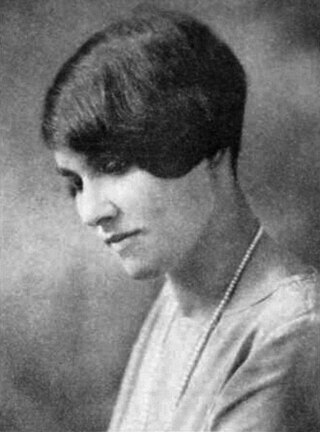
Ethel Elizabeth McGhee Davis was an American educator, social worker, and college administrator. She served as the student adviser (1928–1931) and as the Dean of Women (1931–1932) for Spelman College in Atlanta.
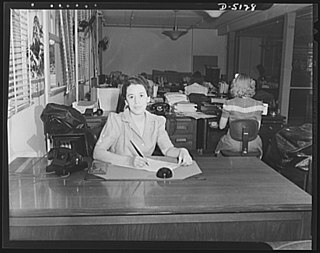
Frances Harriet Williams (1898–1992) was an American activist and civil servant. She was born in 1898 in Danville, Kentucky to Frank L. Williams and Fannie (Miller) Williams but grew up in St. Louis, Missouri. She graduated from Mount Holyoke College in 1919 and earned a master's degree in political science from the University of Chicago in 1931.
The Harlem YWCA in New York, USA, was founded in 1905, moving to its own premises in 1921. It played an important role in developing training and careers for young black women in the early and mid twentieth century, as well as providing safe and respectable accommodation.
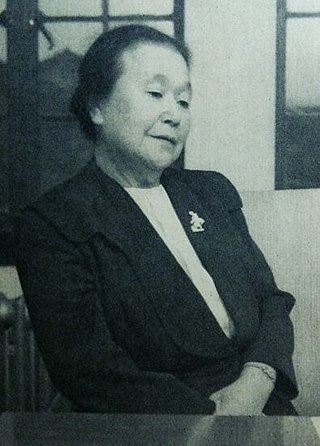
Tamaki Uemura (植村環) was a YWCA executive, pacifist, and Christian pastor in Japan.

Lida Brown McMurry (1853–1942) was an American educator, author, YWCA founder, and prominent figure within American Herbartianism throughout the late nineteenth and early twentieth centuries.

Lucy Perkins Carner was an American sociologist, civil rights activist and pacifist. She was a national executive of the YWCA, and held national roles in peace organizations, including the Women's International League for Peace and Freedom.
Adrienne Lash Jones was an American academic of African-American studies. She was a professor at Oberlin College for most of her career.
References
- 1 2 3 4 5 6 Lindley, Susan Hill; Stebner, Eleanor J. (2008). The Westminster Handbook to Women in American Religious History. Westminster John Knox Press. p. 190. ISBN 9780664224547.
- ↑ Fisk University (1915). Catalog of the Officers, Students and Alumni of Fisk University. The University.
- 1 2 3 Robertson, Nancy Marie (2007). Christian Sisterhood, Race Relations, and the YWCA, 1906-46. University of Illinois Press. ISBN 9780252031939.
- 1 2 3 4 5 "Juanita Saddler of Y. W. C. A. Dies". The New York Times. 13 January 1970. Retrieved 26 February 2019.